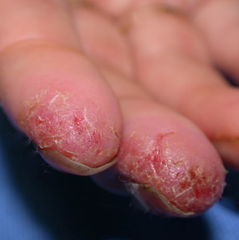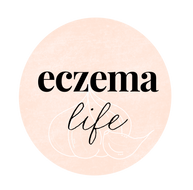Eczema and Dermatitis - What is the difference?
Dermatitis


The word dermatitis means 'skin inflammation' and it is the medical term used for any type of skin inflammation, but there are different types.
What is the difference?
- Eczema is itchy skin inflammation, and dermatitis is not itchy!
Common forms of dermatitis:
Irritant contact dermatitis
- The most common form of dermatitis
- It can occur when the skin becomes inflamed from exposure to chemicals, acids, soaps and detergents etc.
- A rash may develop on your hands along with burning, itching and pain and the reaction may continue until the cause is discovered and avoided.
Allergic contact dermatitis
- Can be triggered by sensitivity reaction or allergy to a substance such as nickel or fragrances (perfume, skin-care etc).
- The skin rash can appear on the area that touched the substance within 24 to 48 hours.
- Itching is another symptom of allergic contact dermatitis but it may occur without itchiness. Allergy testing and dietary changes are advised.
Seborrheic dermatitis
Information can be found here >>
Eczema


Eczema is a sub-group of dermatitis where itchy skin is the main distinguishing factor, along with three or more of the following symptoms:
- itchiness in the skin creases such as the folds behind the knees and elbows, fronts of the ankles or around the neck (children under four years may also have it on their cheeks),
- dry skin,
- visible eczema affecting the outer limbs, cheeks or forehead,
- symptoms appearing within two years of birth (not always an indication but very common), and/or
- family history of eczema, asthma, hay fever or (if under four years old) a history of atopic disease in a first-degree relative.
Other symptoms include:
- oozing/weeping in between the skin folds of the elbows and knees
- thickening of the skin
- poor sleep
- flaking skin
- scratch marks (from scratching!)
People with eczema tend to overheat easily because their skin does not regulate temperature properly. This can occur because the outer skin barrier is damaged. There are many different types of eczema which are covered on my blog.
Fischer, K., 2014, 'Eczema and Dermatitis - What is the difference?' edited extract from The Eczema Diet (Exisle Publishing)
Our eczema products
Click on the photo to view the range >>
Photos L to R from top: contact dermatitis, seborrheic dermatitis, atopic eczema, discoid eczema
READ MORE
The Itchy Dozen Worst Foods for Eczema
REFERENCES: Fischer, K, 2014, The Eczema Diet, Second Edition, Exisle Publishing; Brenninkmeijer, E.E.A., et al., 2008, ‘Diagnostic criteria for atopic dermatitis: a systematic review’, British Journal of Dermatology.

